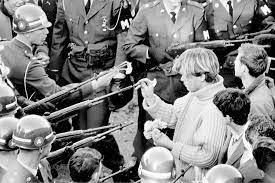Empathy, trust, and doing good with psychedelics
Flower Power - 1967
Nowadays a lot of the research around psychedelics is focussed on the intense hallucinogenic experiences, potential effectiveness in therapy and how it affects brain mechanisms. But this post I would like to focus on a specific field that many may find speculative or associate with the counterculture movements of the 60ties. Although, as I am intending to show in this article, science is helping us to go deeper in our understanding of the question: Do psychedelics increase prosocial behaviour?
Prosocial behaviour can be briefly defined as ‘voluntary behaviour intended to benefit another’ 1 and scientists list many reasons for why humans (and other animals) show this innate sociality, including evolutionary advantages, personal gain, the basic norm of reciprocity and the effect of socialisation. So how come the consumption of psychedelics can have anything to do with this?
In order for a human to have this idea that helping others could be useful in some way, the human first needs to acquire basic cognitive skills such as empathy. We will rely on the definition from 2, where empathy refers to the ability to imagine how another person is thinking and feeling. Humans naturally begin to show this type of psychological empathy at two years old, however not everyone develops in the same manner and over the years other cognitive patterns may overshadow, redirect or redefine this emotional and behavioural pattern. There are numerous studies that investigate the relationship between empathy and psychedelics, using the Multifaceted Empathy Test (MET) 3. Results indicate that psychedelics enhance empathy not only during the experience, but also weeks and even months after having taken psychedelics.
Mukai et al., 2020
However, having empathy alone does not automatically give us the motivation to actually act in a prosocial way. Whilst it is difficult to measure prosocial behaviour in humans reliably since researchers mostly have to rely on retrospective questionnaires and everyday behaviour is difficult to observe reliably, these behaviours have been studied in mice. Thereby we first saw that, when two mice are sitting in a cage and one of them is trapped in a smaller space, the free mouse, which is given MDMA, will start to help the other mouse to free itself from the cage, even if they are not familiar with each other. This is considered very unusual behaviour for mice 4. We can imagine that for a human this might not be an incredibly unusual thing to do if put in the same situation, yet still it shows the power of an empathogen such as MDMA to change previous behavioural patterns into more altruistic ones.
Helping other individuals is the most proximate way to demonstrate prosocial behaviour. But if we think further we might also begin to imagine sociality within a group and the skills that are required to have a pleasant interaction with others. Trust begins to play a role. Research on psychedelic-assisted group psychotherapy has shown that taking psilocybin in group settings improves trust between the participants and acts as a catalyst for creating social bonds and a feeling of connectedness between members of the group 5.
This is great news! But not new, since psychedelics have a long history of this specific purpose: Indigenous people have used psychedelic substances to create peaceful connections between tribes 6, among other areas of application. However, in this view, let's just take one step even further out on the social life scale and look at the big groups we are finding ourselves in, for example in creating peace between countries. Some scientists consider group psychedelic experiences to be potentially helpful in resolving socio-political conflicts 7, similar to the practices of indigenous people.
The mechanism that is behind these compelling thoughts is rooted in the most prevalent effect of the psychedelic experience itself: the feeling of oneness or what Aldous Huxley called the connection to the Mind at Large 8. Within research, this effect is referred to as ‘ego-dissolution’ 9 and describes the feeling of stepping into the experience of a shared humanity, whereby other individual social representations of the self seem to dissolve. This opens oneself up to the possibility of diluting previous boundaries and rigid patterns, not just within the neurocircuitry of the brain, but also of oneself in relationship to the others.
And so the question we wanted to answer in this article is whether psychedelics have the potential of making humanity more prosocial: Whilst there is research indicating this, we cannot say anything for sure right now. The first steps have been made, but there are still a lot of unanswered questions such as: What would happen in the same mouse experiment with substances like LSD? How can we measure altruistic traits in humans? What kind of populations could be tested? Political leaders? Convicted people? If, why and how does ego-dissolution lead to prosocial behaviour?
The potential to make good use of tools within the modern scientific approach is there and so we can hope for such questions to be answered in the future.






